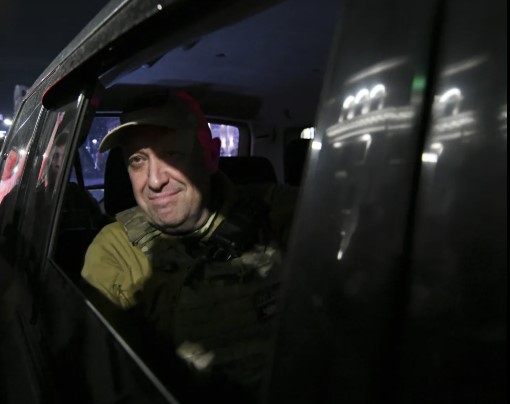On July 4, a senior figure in Russia’s oil industry, Andrei Badalov, lost his life in a shocking and unexplained incident.
Russian Oil Executive’s Sudden Death Raises Alarming Questions
Badalov was the vice president of Transneft, Russia’s largest pipeline transport company. He reportedly died after falling from the window of his apartment in Moscow. This incident has added to a growing list of mysterious deaths among Russian oil executives and other elite figures—especially those involving falls from great heights.
According to the Russian state news agency TASS, law enforcement sources have claimed that Badalov’s death was likely a suicide. But many observers are not convinced. This isn’t the first time a powerful Russian oil executive has died in such circumstances, and critics are pointing out an eerie pattern—especially when the same explanation keeps being given: either suicide or accidental fall.
Ukrainian security expert Ivan Stupak told the Kyiv Independent that these deaths may not be as straightforward as they seem. According to him, it is a known tactic for Russia’s own security services to pressure individuals—often Russian oil executives—leaving them with two harsh choices: either die by suicide and leave their families alone, or face imprisonment and destruction of their wealth.
Geopolitical Gamble: Indonesia Risks Western Backlash Over Russian Oil Deal
Stupak explained, “They can pressure a person in one way or another. Either you kill yourself, and your family is left in peace with what they have, or they start arrests, imprisonments, and leave everyone destitute.” He suggested this method has become a repeated tool used against Russian oil executives and others in powerful positions.
Dozens of Russian Oil Executives and Officials Dead Since 2022
Since the beginning of 2022, dozens of high-ranking officials, business leaders, and executives in Russia have died in mysterious ways. Some were declared suicides. Others were labeled as murder-suicides or accidents. A few involved strange circumstances that still haven’t been fully explained.
In April 2022, Vladislav Avayev, the vice president of Gazprombank—one of Russia’s largest banks—was found dead in Moscow along with his wife and daughter. Authorities claimed that Avayev killed them both before taking his own life.
Just a few days later, another high-profile figure, Sergei Protosenya—a former executive of the Novatek gas company—was found dead in Spain. His wife and daughter were also found dead at the same villa. Spanish media reported that he may have killed his family before hanging himself. However, the case remains unsolved, and questions still surround what really happened.
Security expert Stupak suggested that not all of these deaths may be linked to politics. Some may be tied to financial issues, unpaid debts, business rivalries, or allegations of embezzlement. However, he emphasized that the pattern of these deaths—and the explanations given—suggest a deeper issue that cannot be ignored.
Bone-Crushing Blow? US Bill Threatens 500% Tariff on India, China Over Russian Oil
The Pattern of “Window Falls” Among Russian Oil Executives and Elites
One of the most disturbing parts of these cases is the number of people who have died from “falling out of windows.” Since 2022, at least eight such cases have been recorded. These incidents have involved business executives, government officials, and public figures.
In September 2022, Ravil Maganov—the chairman of Lukoil, Russia’s second-largest oil company—died after falling from a hospital window in Moscow. Lukoil’s official statement said Maganov had a serious illness, while Russian state media later reported it as a suicide.
That same year, Pavel Antonov, a member of the Russian parliament, was found dead at a hotel in India. He reportedly fell from the third floor. His death happened just days after his friend died in the same hotel. Local reports said Antonov was “depressed” over the loss.
On February 6 this year, Russian singer-songwriter Vadim Stroykin also died under suspicious circumstances. During a raid by Russian security forces, he fell from the 10th floor of his apartment in St. Petersburg. Authorities called it a suicide. But Stroykin had earlier spoken out against the war in Ukraine and had openly criticized Russian President Vladimir Putin.
Physically throwing someone out of a window would typically require multiple people and would be noisy and difficult to hide. However, Stupak believes that sometimes, this is done intentionally and publicly—to send a strong message to others.
He explained, “Look at what happened with (Yevgeny) Prigozhin. He could’ve been poisoned in Africa, and they could have blamed it on food. But they chose a very public and symbolic death.” Prigozhin, the founder of the Wagner Group, died in a suspicious plane crash in 2023, just two months after he staged a brief rebellion against Russian authorities.
Elite Under Pressure: Prison or the Window
This idea of sending a message through dramatic deaths appears to be growing stronger. Whether it’s through arrests, imprisonment, or sudden “accidents,” experts believe the pressure on Russia’s elite—including Russian oil executives—is increasing rapidly.
Even top officials are not immune. On July 1, Russia’s deputy defense minister, Timur Ivanov, was sentenced to 13 years in prison on charges of bribery and embezzlement. He was once praised as a Hero of Russia, but now he has lost his status, his property, and his freedom.
America Told Us Not to Strike Back: Zelensky Slams U.S. Oil Shield for Russia After Deadly Attacks
According to Stupak, “This shows just how ruthless the regime can be. Either you mysteriously die, or you end up behind bars.” He noted that Russian oil executives, despite their high status and economic influence, are not spared from this tightening grip.
He further explained that economic pressure and internal fighting are making the situation worse. With Western companies pulling out and local businesses struggling, many Russian oil executives are finding it difficult to maintain profits. As a result, they may become targets in the ongoing crackdown.
“Those who refuse to cooperate,” Stupak said, “end up either in prison or out the window.”

